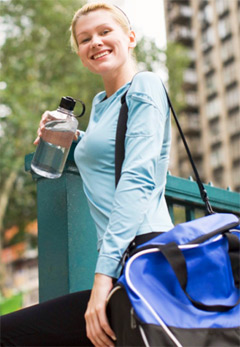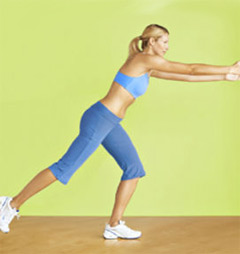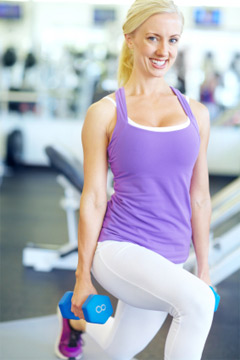|
|
Make Your Workouts More Functional
 Functional
strength training simply means training our bodies to better perform the
types of movements we use for everyday life. Functional
strength training simply means training our bodies to better perform the
types of movements we use for everyday life.
When you isolate body parts, as you sometimes do with traditional strength
training, you end up training your
muscles but not your movements. One way to
change that is to look for ways to make your
strength exercises
more functional:
-
Emphasize free weights: Machines have a place in strength
training, but they offer so much support that the body doesn't have to work as
hard to maintain balance and good form. In real life, we don't have that kind
of support. Using dumbbells,
bands or cables forces your body to create it's
own support, which leads to a stronger body overall. Use them in combination
with compound exercises like
squats,
lunges,
shoulder
presses, etc. Begin with 3-4 pounds dumbbells and progress to 8-10.
-
Develop that Core:
Core
muscles are often neglected in working out but they are essential for
everything we do. They are
stabilizer muscles
which help keep you upright (improved
posture) and
improve balance. They allow you to use your other muscles more effectively in
your arms and
legs. The core consists of
your back
and abdominal muscles and
there are others that are deeper such as the
tranverse abdominis.
-
Use a stability ball: Doing some exercises on a ball, such as
chest
presses or
pushups involves more stabilizers, the muscles that work to protect
joints and maintain alignment.
-
Combine movements: We usually do a combination of motions
throughout the day. We lunge forward to open a door and then rotate while
stepping through. Combining strength exercises together, like lunging forward
with a reach or squatting with an
overhead press
can mimic this dynamic way of
moving.
-
 Try unilateral exercises: Doing one-legged squats or using one arm
at a time for moves like flies or chest presses forces your core to engage as
well as your stabilizers, making these moves more functional and challenging. One arm movements add functionality while
still doing a great job
building muscle
mass. Try unilateral exercises: Doing one-legged squats or using one arm
at a time for moves like flies or chest presses forces your core to engage as
well as your stabilizers, making these moves more functional and challenging. One arm movements add functionality while
still doing a great job
building muscle
mass.
-
Use more compound, large muscle mass, multi-joint
exercises and fewer isolation movements: Isolation movements often provide
the finishing touch that give bodybuilders the �polished� look that many
strength athletes lack. As such, bodybuilders should certainly use isolation
movements such as machine
flys,
leg
extensions and
lateral raises
to round out their routines. However, doing primarily
isolation movements is a mistake. Compound, multi joint exercises like squats,
presses and rows are unsurpassed for strength, muscle mass,
power and functionality
and should remain in a
bodybuilder�s
program year round � even before competitions.
Being creative with your workouts can build functionality while making your
routines more fun. These functional workouts offer new ideas for how to train
your body:
There are four functional exercises that will help you get the most out of
your body, namely:
-
Push-ups: Start with wall push-ups and progress to placing your
hands on the kitchen counter. You can do 5-6 while waiting for the microwave
to finish. These firm your chest, arms, abs and back.
-
 Squats or lunges: Most reaching, lifting and bending movements
involve an element of squatting or lunging. Remember to push out your butt and
don't let your knees go farther forward than your toes. You'll strengthen your
knees, quads and hips. Squats or lunges: Most reaching, lifting and bending movements
involve an element of squatting or lunging. Remember to push out your butt and
don't let your knees go farther forward than your toes. You'll strengthen your
knees, quads and hips.
-
Bag Lifts: Each time you go shopping strengthen your arms by
lifting a bag 6 times to the front, side and rear. You can also do a modified
bicep curl.
Just remember to keep your shoulders back and abs tight while working your
arms.
-
Lift: Pick-up that heavy pet food bag or laundry basket by squaring
your feet shoulder width apart, squatting down, grabbing hold and pushing up
with your legs. Put it down and do it again. If your knees hurt, practice
lifting from a chair until you get stronger.
Remember, the time spent developing dynamic strength,
flexibility
and agility carries over into
your daily activities, making life a little bit easier.
Namita Nayyar (WF Team)
Dated 04 January 2014
Related Links
|
|
|
|









